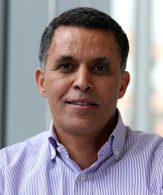Previous page
 Brahim NAIT OUMESMAR
PhD, DR2, INSERM
Team “Myelin plasticity and regeneration”
https://institutducerveau-icm.org/fr/team/equipe-nait-oumesmar-zujovic/
Brahim NAIT OUMESMAR
PhD, DR2, INSERM
Team “Myelin plasticity and regeneration”
https://institutducerveau-icm.org/fr/team/equipe-nait-oumesmar-zujovic/
 Brahim NAIT OUMESMAR
PhD, DR2, INSERM
Team “Myelin plasticity and regeneration”
https://institutducerveau-icm.org/fr/team/equipe-nait-oumesmar-zujovic/
Brahim NAIT OUMESMAR
PhD, DR2, INSERM
Team “Myelin plasticity and regeneration”
https://institutducerveau-icm.org/fr/team/equipe-nait-oumesmar-zujovic/
Biography
Brahim Nait Oumesmar is Director of Research at Inserm, and co-leader of the team "Myelin Plasticity and Regeneration" at the Paris Brain Institute (ICM). He received a Ph.D. in Neuroscience at Sorbonne Université in 1997, and did his post-doctoral training in Developmental Neurobiology at the Mount Sinai School of Medicine (New York, NY, USA). Brahim Nait Oumesmar is a member the executive committee of NeurATRIS, coordinator the IHU research programs on multiple sclerosis at the ICM, and elected president of the French Glial Cell Club. He is also member of several scientific boards and expert for several funding agencies, including the ERC, MRC, Biological Sciences Research Council (UK), ANR and international multiple sclerosis societies. Brahim Nait Oumesmar has an internationally renowned expertise in cellular and molecular mechanisms of myelination and remyelination in the central nervous system. He has made seminal contributions to the mechanisms of myelin regeneration and to the development of experimental therapeutics to promote remyelination in multiple sclerosis and myelin-related diseases. His laboratory has a strong expertise in glial cell cultures, molecular biology, oligodendrocyte differentiation and regeneration, experimental models of myelin diseases and multiple sclerosis.Research work
The research of Brahim Nait Oumesmar is focused on the cellular and molecular mechanisms of myelination and myelin regeneration (also termed remyelination) in the central nervous system, with the main goal to understand why remyelination fails in multiple sclerosis (MS) and to develop new therapeutics to enhance this regenerative process in MS and myelin-related diseases. His group is mainly interested in :- The function of axoglial interactions in (re)-myelination
- The development of pharmacological strategies enhancing myelin regeneration, using various preclinical models of MS and myelin-related diseases,
- The neuropathology of MS lesions.
Publications
- Aït Amiri S, Deboux C, Soualmia F, Chaaya N, Louet M, Duplus E, Betuing S, Nait-Oumesmar B*, Masurier N*, El Amri C* (2021) Identification of First-in-Class Inhibitors of Kallikrein-Related Peptidase 6 That Promote Oligodendrocyte Differentiation. J. Med. Chem. 64(9): 10.1021/acs (*co-last authors)
- Maas DA, Eijsink VD, Spoelder M, van Hulten JA, De Weerd P, Homberg JR, Vallès A, Nait-Oumesmar B*, Martens GJM* (2020) Interneuron hypomyelination is associated with cognitive inflexibility in a rat model of schizophrenia. Nature Communications 11(1):2329 (*co-last authors)
- Ortiz FC, Habermacher C, Graciarena M, Houry PY, Nishiyama A, Nait Oumesmar B, Angulo MC (2019) Neuronal activity in vivo enhances functional myelin repair. JCI Insight 5(9):e123434.
- Fauveau M, Wilmet B, Deboux C, Benardais K, Bachelin C, Temporão AC, Kerninon C, Nait-Oumesmar B (2018) SOX17 transcription factor negatively regulates oligodendrocyte precursor cell differentiation. Glia 66:2221-2232.
- Wegener A, Deboux C, Bachelin C, Frah M, Kerninon C, Seilhean D, Weider M, Wegner M, Nait-Oumesmar B. Gain of Olig2 function in oligodendrocyte progenitors promotes remyelination. Brain. 2015 Jan;138(Pt 1):120-35.


